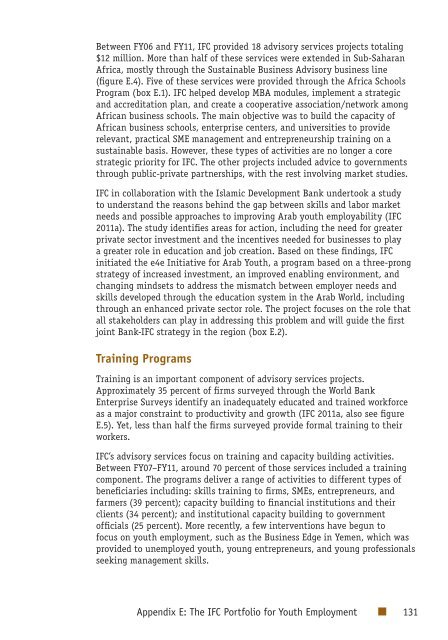Youth Employment Programs - Independent Evaluation Group
Youth Employment Programs - Independent Evaluation Group
Youth Employment Programs - Independent Evaluation Group
You also want an ePaper? Increase the reach of your titles
YUMPU automatically turns print PDFs into web optimized ePapers that Google loves.
Between FY06 and FY11, IFC provided 18 advisory services projects totaling$12 million. More than half of these services were extended in Sub-SaharanAfrica, mostly through the Sustainable Business Advisory business line(figure E.4). Five of these services were provided through the Africa SchoolsProgram (box E.1). IFC helped develop MBA modules, implement a strategicand accreditation plan, and create a cooperative association/network amongAfrican business schools. The main objective was to build the capacity ofAfrican business schools, enterprise centers, and universities to providerelevant, practical SME management and entrepreneurship training on asustainable basis. However, these types of activities are no longer a corestrategic priority for IFC. The other projects included advice to governmentsthrough public-private partnerships, with the rest involving market studies.IFC in collaboration with the Islamic Development Bank undertook a studyto understand the reasons behind the gap between skills and labor marketneeds and possible approaches to improving Arab youth employability (IFC2011a). The study identifies areas for action, including the need for greaterprivate sector investment and the incentives needed for businesses to playa greater role in education and job creation. Based on these findings, IFCinitiated the e4e Initiative for Arab <strong>Youth</strong>, a program based on a three-prongstrategy of increased investment, an improved enabling environment, andchanging mindsets to address the mismatch between employer needs andskills developed through the education system in the Arab World, includingthrough an enhanced private sector role. The project focuses on the role thatall stakeholders can play in addressing this problem and will guide the firstjoint Bank-IFC strategy in the region (box E.2).Training <strong>Programs</strong>Training is an important component of advisory services projects.Approximately 35 percent of firms surveyed through the World BankEnterprise Surveys identify an inadequately educated and trained workforceas a major constraint to productivity and growth (IFC 2011a, also see figureE.5). Yet, less than half the firms surveyed provide formal training to theirworkers.IFC’s advisory services focus on training and capacity building activities.Between FY07–FY11, around 70 percent of those services included a trainingcomponent. The programs deliver a range of activities to different types ofbeneficiaries including: skills training to firms, SMEs, entrepreneurs, andfarmers (39 percent); capacity building to financial institutions and theirclients (34 percent); and institutional capacity building to governmentofficials (25 percent). More recently, a few interventions have begun tofocus on youth employment, such as the Business Edge in Yemen, which wasprovided to unemployed youth, young entrepreneurs, and young professionalsseeking management skills.Appendix E: The IFC Portfolio for <strong>Youth</strong> <strong>Employment</strong> 131
















